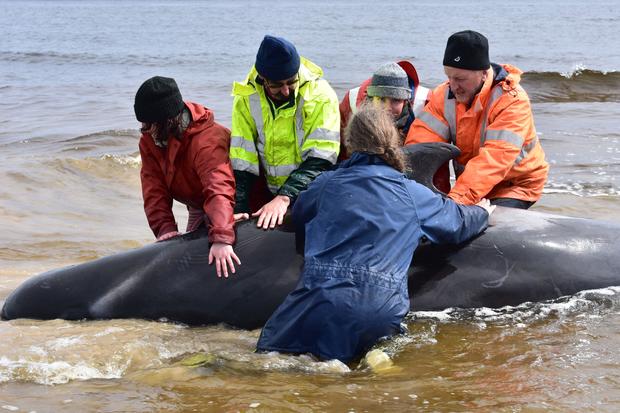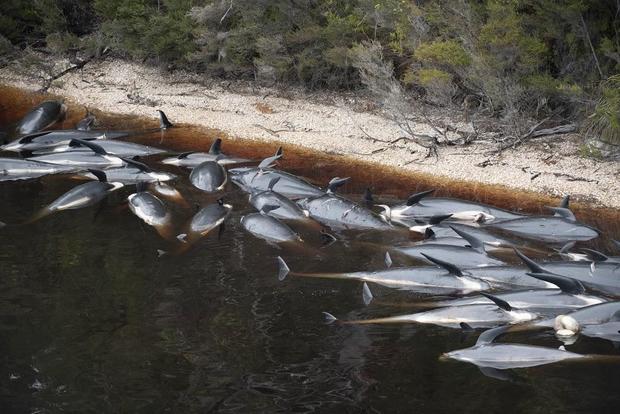Australian wildlife officials began disposing of hundreds of dead whales on Saturday following one of the largest-ever mass stranding events globally. They have officially ended rescue efforts, believing there are no more survivors.
Conservation experts and trained volunteers were able to save 108 of the approximately 470 long-finned pilot whales spotted on a remote sandbank in Tasmania's Macquarie Harbour on Monday. Rescuers have spent the last five days performing dangerous rescue missions amid unpredictable conditions to save as many animals as they could.
Marine Conservation Program wildlife biologist Dr. Kris Carlyon said in a statement that rescuers did a terrific job saving the whales. "We only had one whale restrand overnight, which is a good result given 20 whales were released yesterday," Carlyon said.
"Every whale saved is an incredible outcome given the complicated conditions and is testament to the tireless and skilful work that the response team are undertaking," Peter Gutwein, Tasmania's premier, said in a statement. "At times like these, Tasmanians come together to respond as quickly and compassionately as possible."
Rob Buck, Incident Controller and Parks and Wildlife Service manager, said officials have so far disposed of 15 whales at sea in order to test the disposal method. He expects it to take several days to complete the task depending on the wind, tide and other conditions.
The bodies of the whales are being separated into pods and enclosed with water booms, in an attempt to keep them in one place, isolated from sharks and other marine life.
"Collection and disposal is being undertaken with the assistance of aquaculture companies whose equipment and expertise on the harbour is essential for a timely and effective outcome," Buck said.
"We know it's hard for people to watch from afar and thank the community for allowing our teams to focus on the critical work required for the response," Buck said.
Officials expect the highly social whales that were rescued to eventually "regroup" and recover from the traumatic event.
While mass whale strandings occur relatively often in Tasmania, such a large group has not been seen in the area for more than a decade. The causes remain unknown — however, some researchers have suggested the whales may have gone off track after feeding close to the shoreline or by following one or two whales that strayed.
Officials said it's possible that whales will be found in surrounding areas in the coming days, and asked locals to report sightings.
World - Latest - Google News
September 27, 2020 at 01:29AM
https://ift.tt/3mXAwTu
Australia begins disposal of over 350 dead whales after ending rescue mission - CBS News
World - Latest - Google News
https://ift.tt/2SeTG7d
Bagikan Berita Ini
















0 Response to "Australia begins disposal of over 350 dead whales after ending rescue mission - CBS News"
Post a Comment